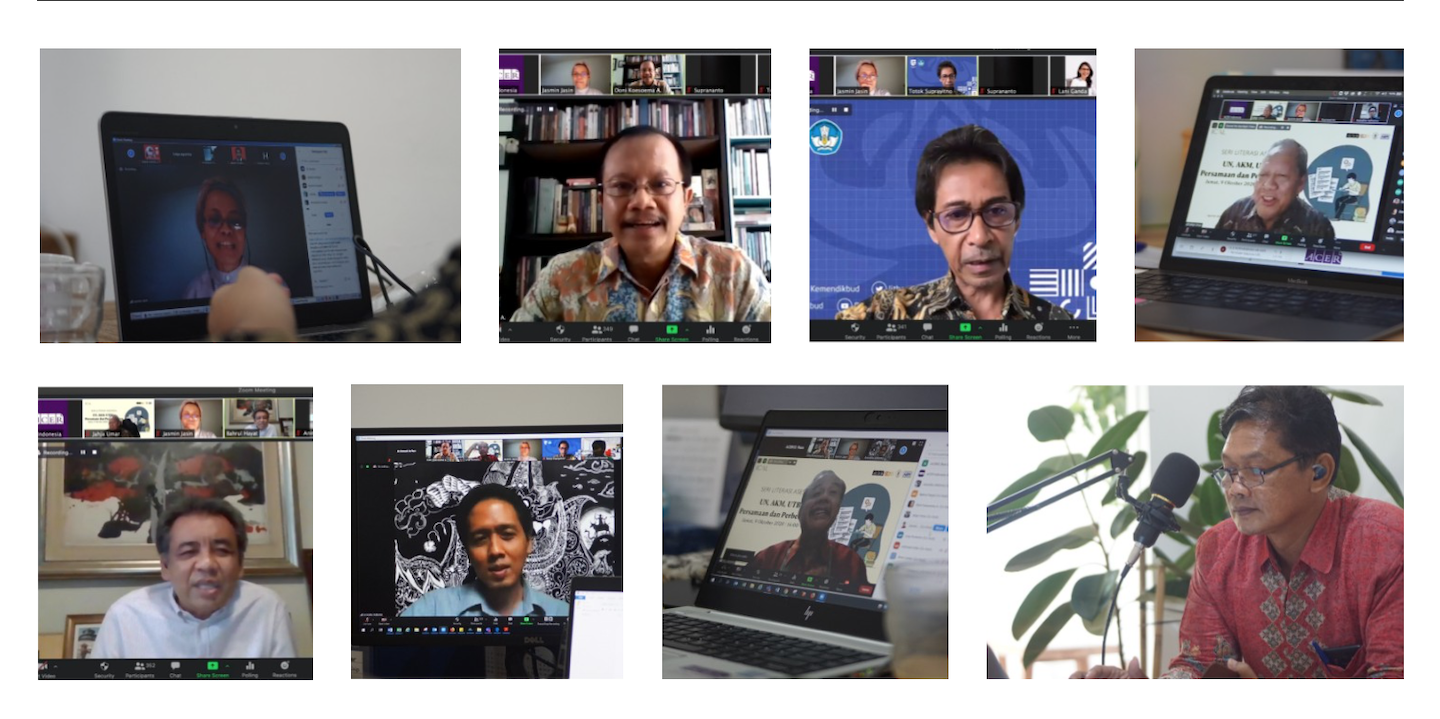
School Assessments in Indonesia: Similarities and Differences
ACER news 28 Oct 2020 5 minute readACER Indonesia’s recent sharing session, held in conjunction with the Indonesian Educational Evaluation Association (HEPI) and Indonesian Psychometric Association (APSIMETRI), shed light on the country’s student assessments, namely the National Exam (UN), University Entrance Exam (UTBK), and the newly introduced Minimum Competency Assessment (AKM), answering many unanswered questions.
2019 marked the end of Indonesia’s long-reigning National Exam, the standardized test required for graduation. An apparent successor by the name of AKM surfaced, albeit with a distinct system. Among its most distinct features is the fact that it is carried out midway through elementary (fourth grade), junior high (eighth grade), and high school (eleventh grade). It also observes only a sample of students that represents the rest and serves mainly as feedback for educational improvement/s. In parallel, the computer-based university entrance exam known as UTBK continues.
The impression that there is an absence of a graduation requirement is apparent, not to mention the general lack of distinction in terms of the assessments' purpose. This sharing session, attended by over 350 people who were mostly teachers, set out to provide clarity to the matter. Panelists were stakeholders from across Indonesia’s assessment realm, ranging from a Ministry of Education and Culture (MoEC, the originator of AKM) representative to the mind behind the UN.
First to speak was Totok Suprayitno, Head of the Agency for Research and Development and Textbooks at the Ministry of Education and Culture (Balitbang Kemdikbud). AKM, he pointed out, was born out of the need for an honest reflection of Indonesia’s education system. It is an attempt to better Indonesia’s performance in international assessments, such as PISA and TIMSS. It also seeks to improve students’ learning outcomes and combat 'teaching to the test' behavior.
These were problems associated with UN. Additionally, UN traded off depth of assessment for the sake of nationwide coverage. Lack of integrity was also rampant when it was paper-based, although this had since been addressed by its computer-based counterpart, UNBK. So why have we opted for a completely new assessment?
It is widely agreed that Indonesia needs a more in-depth and holistic assessment, that measures individual characteristics and the school environment as well as literacy and numeracy skills. These are core competencies that in general would help students to learn more, and which AKM planned to address.
Bahrul Hayat, Chairman of the Indonesian Educational Evaluation Association (HEPI), spoke last and emphasized the need to identify whether AKM carries the same objective as UN. It can only serve as UN’s replacement if it does.
An excellent example of a different purpose is UTBK. Urip Purwono of Higher Education Entrance Examination Institute (LTMPT), the body that organises UTBK, explained how this particular test persists despite the presence of UN and AKM. UTBK is present because the quota of available university places is far exceeded by the number of applicants. Unlike UN, which serves as a graduation requirement and therefore allows for 99 percent passing rate, UTBK purposely compares one student’s score with another via norm-referenced testing. It seeks to detect each student’s likeliness to succeed in university. Unlike AKM, UTBK is not meant to reflect the education system.
A table of comparisons between UN, AKM, and UTBK was shown by Doni Koesoema of National Education Standards Agency (BSNP), UN’s implementing body. He based the parameters on the underlying regulations for student assessment, namely Government Regulation (PP) 19/2005 and the National Education System Law (UU Sisdiknas). Among the highlighted distinctions included the fact that AKM, unlike UN, does not meet the requirement of UU Sisdiknas Article 58 Paragraph 2, which stipulates that student evaluation must be carried out by an independent institution, such as BSNP. AKM was also highlighted as not having the same goals as UN because it only observes a sample of students and does not map student learning outcomes nationwide. In fact, UN and AKM only shared similarities in four of the 19 comparisons laid out.
Jahja Umar of the Indonesian Assessment Institute (IAI) further echoed this sentiment. As the brain behind UN, he emphasized UN’s purpose to test Indonesian students’ competencies and set a standard for graduation, similar to the GCE in the UK. While National Examination in practice had its challenges, Mr Umar suggested it should be improved and retained. The fact that AKM does not serve as a graduation requirement further cemented his view that treating AKM as UN’s replacement would lead the Indonesian education system to miss an essential component.
-------
